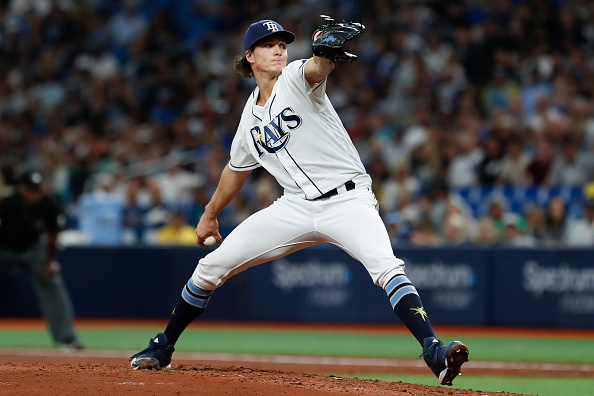Beth Sullivan | May 13th, 2019
I’m sure many baseball fans were convinced that Tyler Glasnow’s season was over when they heard he left the game Friday night with forearm tightness in his throwing arm. There were many armchair doctors on Twitter and other social media sites who had him diagnosed with all sorts of ailments, without any medical testing or knowledge of what they were talking about.
I know most baseball fans assume Tommy John injury when they hear pitcher and forearm pain in the same sentence. However, other things cause forearm pain too. I covered Tommy John Surgery History and Recovery a few months ago, so I will just refer you to that article and today we will discuss other things that can cause forearm pain and stiffness.
The forearm is not a very large area as body parts go, however it is the home of many muscles, tendons, arteries, veins, and nerves. There are eight flexor muscles in the anterior forearm that are responsible for curling the fingers and the wrist toward the palm as well as assisting in pronation of the wrist and forearm. Three of these are deep muscles and five of them are superficial. There are twelve muscles in the extensor compartment on the posterior of the arm which is responsible for extending the wrist and fingers as well as flexing the elbow. That is a lot of anatomical parts that have to work together to allow a baseball pitcher to be able to forcefully and accurately throw a pitch from the mound to the catcher.
There are a lot of games in a baseball season, and even though pitchers don’t pitch every day, the muscles in the forearm get a major beating every time they do. Glasnow was diagnosed with a mild forearm strain and is expected to miss four to eight weeks. I discussed Is it a Sprain or a Strain? previously. So if you want to know the difference, give this article a look.
Glasnow’s injury can be related to many things including:
- Throwing forcibly without a proper warm-up.
- Trying to throw a ball too hard or throwing with poor mechanics, causing a strain in one or multiple forearm muscles.
- Throwing too many pitches in a game or too many of the same type of pitch.
- Not following through the pitching motion (stopping the arm too soon at the end of the motion).
- Excessive pronation (rotation from palm up to palm down) of the forearm mostly seen in curveballs.
- Not throwing for a period of time and trying to come back too fast. (The reason why spring training and pitch counts are employed)
A forearm strain is a tough injury to heal from. Not because the injury is so terrible, but because it is very difficult to make it through the day without using your forearm and hand. To allow for adequate recovery, limited use of the forearm must be undertaken. As the frayed muscle(s) heal, trying to use them while healing can lead to further injury.
I know many fans are worried about a UCL component to this. However, since no symptoms associated with that type of injury have been reported, I am not currently concerned with that possibility. Given adequate time for the inflammation to resolve, the micro-muscle tears to heal, and adequate physical therapy to help strengthen the forearm muscles, Glasnow should return to pitching without sacrificing his whole season. However, if he returns before the condition has fully resolved, it could become a nagging painful injury.
Questions and comments?
thescorecrowsports@gmail.com
Follow Us on Twitter @thescorecrow
Follow Us on Reddit at u/TheScorecrow
Follow Us on Facebook at The Scorecrow
Follow Us on Instagram at The Scorecrow
Follow Beth Sullivan on Twitter @GAPeachPolymer
Main Image Credit:
[getty src=”1142724986″ width=”594″ height=”396″ tld=”com”]




